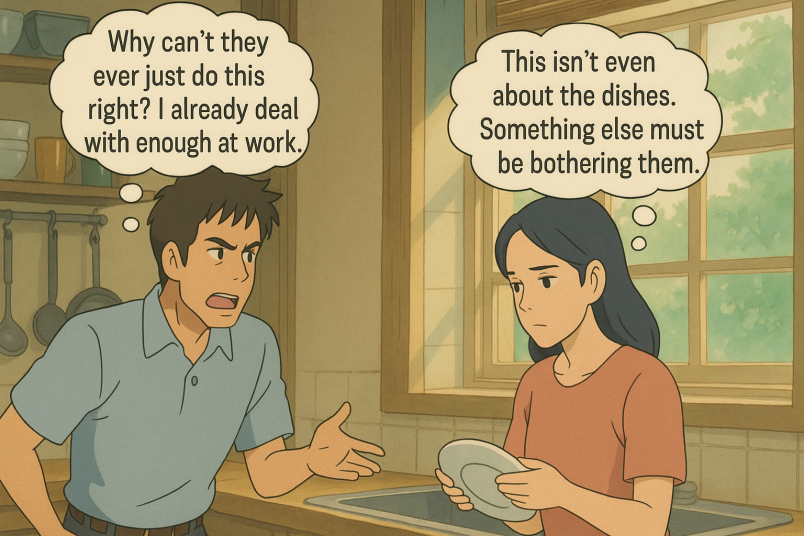9 Tips for Coping With Displaced Aggression in Relationships

Heal & Grow Daily for a Happier Relationship
Subscribe FREEKey Takeaways
Marriage.com AI Quick Summary
It’s hard, isn’t it?
When someone you love lashes out — not because of something you’ve done, but because life has worn them down… work, family, the world itself. You might try to brush it off; you tell yourself, “They’re just stressed.”
But deep down, it hurts. Words stick, tone matters, and silence speaks volumes. Sometimes, people don’t realize they’re directing anger where it doesn’t belong — this is called displaced aggression. It sneaks into relationships in quiet, painful ways.
You may start wondering, “Why me? Why now?” Or worse… “Will this keep happening?”
Your heart deserves gentleness. And even in these moments — especially in these moments — compassion (for them and yourself) matters more than ever.
What is displaced aggression?
Displaced aggression is a common emotional phenomenon where a person directs frustration, irritation, or rage toward someone or something unrelated to the actual cause of their distress.
Instead of confronting the source of their anger, individuals lash out at innocent parties, often those closest to them. This misplaced expression of emotions can lead to strained relationships, misunderstandings, and emotional turmoil for the person experiencing the anger and the recipient.
5 possible causes of displaced aggression
Displaced aggression doesn’t come out of nowhere — there’s always something brewing beneath the surface. Stress, past experiences, and even small daily frustrations can build up until they spill over… often in the wrong direction.
Understanding where this behavior comes from can make it feel a little less personal and a little more manageable. Here are 5 common reasons why it happens.
1. Emotional suppression
People may suppress their emotions, especially anger, due to societal norms or fear of confrontation. When anger remains unaddressed, it can build up over time and find an outlet in seemingly unrelated situations, resulting in displaced anger.
A study on American and Japanese older adults found that anger suppression increases perceived stress through social anxiety. This link was stronger in Japan. Recognizing both universal and cultural aspects of emotion regulation is key to improving future research, theory, and interventions.
For example, someone conditioned to believe that expressing anger is unacceptable may unconsciously redirect their feelings towards a less intimidating target.
Here’s how it shows up:
- Mood swings without a clear reason
- Passive-aggressive comments toward loved ones
- Sarcasm or snide remarks when feeling overwhelmed
- Seemingly minor things trigger big emotional reactions
2. Transference
Displaced anger can occur through transference, where emotions from one context are shifted onto another person or situation. This often happens when individuals experience unresolved issues with authority figures, family members, or past relationships.
They may inadvertently transfer the feelings associated with those experiences onto their current relationships, unleashing displaced anger on their present loved ones.
Here’s how it shows up:
- Criticizing others for small mistakes that aren’t really the issue
- Overreacting to harmless comments
- Irritability toward people who remind them (subconsciously) of someone from the past
- Blaming partners or friends unfairly
3. Stress and pressure
High stress levels and pressure in personal or professional life can create a breeding ground for displacement aggression.
Individuals overwhelmed by their responsibilities and unable to cope with the intensity of their emotions may involuntarily displace their anger onto others who become easy targets, like friends, partners, or colleagues.
Here’s how it shows up:
- Snapping at loved ones after a tough day at work
- Becoming impatient or critical over small things
- Being “on edge” and defensive in conversations
- Escalating small conflicts unnecessarily
4. Childhood trauma
Past traumatic experiences, especially during childhood, can profoundly impact emotional regulation in adulthood. Individuals who have endured neglect, abuse, or witnessed aggressive behavior may struggle to handle their emotions appropriately.
Unresolved traumas may resurface during triggering situations, leading to displaced anger as a coping mechanism.
Here’s how it shows up:
- Reacting intensely to situations that remind them of the past
- Difficulty trusting others, leading to defensive behavior
- Unexpected emotional outbursts in safe or familiar environments
- Pulling away emotionally, followed by lashing out
5. Frustration with powerlessness
Feeling powerless or unable to control a situation can be frustrating, which can lead to displaced anger. When individuals face challenges beyond their control, they may direct their anger toward those they perceive as vulnerable or less assertive.
You can see it as when workplace stress or external pressures are imposed on family members or friends.
Here’s how it shows up:
- Controlling behavior toward others at home
- Taking frustrations out on children, pets, or partners
- Blaming others for problems that feel overwhelming
- Becoming critical or harsh when feeling helpless
Are there any damaging effects of displaced aggression on relationships?
Displaced aggression can quietly chip away at the foundation of even the strongest relationships. Over time, what starts as frustration or stress can turn into patterns of hurt, confusion, and distance. Here’s how it shows up and why it can be so damaging.
-
Strained relationships
Displaced anger can cause significant strain in personal relationships. When one person directs their anger at an innocent party, it can lead to feelings of hurt, betrayal, and confusion.
The recipient of the displaced anger may become resentful or defensive, further escalating tensions and creating distance between individuals.
For example, a partner might lash out after a bad day at work, leaving the other person feeling blamed or emotionally bruised for no clear reason.
-
Communication breakdown
Anger, when displaced, can cloud communication channels. Instead of addressing the real issues, individuals may engage in heated arguments, making it challenging to have constructive conversations.
Misunderstandings may arise, and the core problems often remain unresolved.
For example, small disagreements quickly spiral into bigger fights, leaving both people feeling unheard and emotionally disconnected.
-
Emotional toll
For the person experiencing displaced anger, the emotional toll can be immense.
Guilt, shame, and regret may surface once they realize the harm caused to others. This can create a cycle of self-blame and further contribute to emotional distress.
For example, after snapping at a loved one, a person may spend hours or days feeling guilty and ashamed, replaying the situation in their mind.
-
Escalation of conflict
Displaced anger can fuel a vicious cycle of escalating conflict. As frustration is projected onto others, they may, in turn, react negatively, triggering even more anger.
This may lead to a destructive pattern of conflict that can damage relationships and leave emotional scars.
For example, a small misunderstanding turns into a shouting match where both people say things they don’t truly mean, deepening the hurt.
-
Impact on mental health
Chronic displaced anger can take a toll on mental health. Individuals may experience increased anxiety, depression, and stress as they struggle to manage their emotions effectively.
Persistent anger can also lead to physical health issues, such as high blood pressure and heart problems.
For example, someone who regularly displaces their aggression may start feeling constantly anxious, exhausted, and overwhelmed, struggling to find peace.
-
Repetitive patterns
If displaced anger remains unaddressed, it can become a repetitive pattern in a person’s life.
They may unknowingly repeat this behavior in various relationships and situations, perpetuating a cycle of negative emotions and damaged connections.
For example, a person might lash out at partners, friends, or coworkers in every new relationship, never realizing they’re stuck in the same pattern.
-
Negative social impact
Displaced anger not only affects individual relationships but can also have broader social repercussions.
In extreme cases, it may lead to aggressive or violent behavior, posing risks to the safety and well-being of others.
For example, someone might lose friendships, face disciplinary action at work, or even legal consequences because of repeated outbursts at the wrong people.
9 tips for coping with displaced aggression in relationships
When anger is displaced, it can lead to misunderstandings, strained relationships, and internal turmoil. Coping with displaced anger is essential for maintaining emotional well-being and fostering healthier interactions with others.
Know practical tips to help you manage displaced anger and cultivate a more peaceful and understanding mindset.
1. Identify the root cause
It is crucial to pinpoint the natural source of your frustrations to cope with displaced anger. Take a moment to reflect on recent events or triggers that might have contributed to your anger.
By recognizing the underlying cause, you can address the issue directly and avoid misplacing your anger onto others.
You can start this way:
- Keep a small journal to jot down what triggered your mood.
- Ask yourself, “What’s really upsetting me right now? Is it truly this person or something else?”
- Review patterns—notice if similar frustrations show up repeatedly.
2. Practice mindfulness
Mindfulness is the art of staying present and completely aware of your thoughts, emotions, and bodily sensations.
Both trait and state mindfulness are linked to lower aggression by reducing anger rumination more than anger intensity. A 35-day study found that mindfulness indirectly decreases anger expression and aggressiveness. Mindfulness training may help individuals manage anger by limiting both rumination and emotional intensity.
Engaging in mindfulness exercises, like meditation or deep breathing, can help you become more attuned to your emotions. This heightened awareness allows you to recognize displaced anger as it arises, allowing you to respond more constructively.
You can start this way:
- Practice 5-10 minutes of slow, intentional breathing when you feel on edge.
- Use mindfulness apps like Headspace or Calm to build consistency.
- Pause during stressful moments and silently ask, “What am I feeling in my body right now?”
3. Express yourself calmly
When dealing with displaced anger, it’s essential to communicate your feelings calmly and assertively. Avoid aggressive or passive-aggressive behavior that may escalate conflicts. Instead, use “I” statements to express your feelings without blaming or attacking others.
For instance, say, “I feel upset because of what happened,” instead of, “You always make me angry when you do that.”
You can start this way:
- Practice saying your feelings out loud when alone to get comfortable.
- Write down how you’d express frustration using “I feel…” statements.
- Pause before speaking during conflict to check your tone and intent.
4. Engage in physical activities
Physical activities can be an excellent outlet for releasing pent-up anger. Engaging in exercise, sports, or even walking can help you release tension and rechannel your emotions positively.
Research indicates that anger is a normal human emotion, but can become harmful if suppressed or poorly expressed. It exists as a state or trait of anger. Regular physical exercise is an effective, side-effect-free strategy for managing anger, helping individuals release emotions and reduce the intensity of angry reactions.
The endorphins released during workout activities can also uplift your mood and reduce feelings of anger.
You can start this way:
- Go for a brisk 20-minute walk when frustration builds.
- Try activities like boxing, running, or yoga to release tension physically.
- Commit to regular movement 3-4 times a week as preventive care.
5. Seek support
Don’t hesitate to contact friends, family, or a therapist when coping with displaced anger. Communicating your feelings to someone you trust can provide valuable insights and emotional support.
A therapist can also help you explore the root causes of your anger and develop healthier coping strategies.
You can start this way:
- Reach out to a trusted friend and simply say, “I’m struggling with my temper lately. Can we talk?”
- Join a support group (online or in-person) focused on emotional health.
- Consider scheduling a therapy session—even one can offer clarity.
6. Practice empathy
When you feel anger bubbling up, take a moment to consider the other person’s perspective. Practicing empathy allows you to understand others’ feelings and motivations, which can defuse misplaced anger.
Remember that everyone experiences their struggles, and reacting with empathy can lead to more productive conversations.
You can start this way:
- Ask yourself, “What might they be going through right now?”
- Reframe frustrations by considering their point of view, even briefly.
- Pause and listen fully before responding when you feel triggered.
7. Implement stress-reduction techniques
Stress is often a significant contributor to displaced anger. Implementing stress-reduction techniques, such as yoga, progressive muscle relaxation, or spending time in nature, can help you manage stress levels more effectively.
As stress decreases, the likelihood of displacing anger onto others diminishes.
You can start this way:
- Dedicate 10 minutes daily to relaxation, such as stretching or breathing.
- Try listening to calming music or guided meditations after a stressful day.
- Create a “stress toolbox” with quick strategies you can turn to.
Watch this video featuring therapist Emma McAdam to quickly reduce stress with a simple 3-minute box breathing exercise:
8. Create a positive environment
Surround yourself with positivity to create a nurturing environment that promotes emotional well-being. Engage in exercises that bring you joy, cultivate hobbies, and spend time with supportive individuals.
A positive environment can foster emotional resilience and reduce the likelihood of displacing anger onto others.
You can start this way:
- Declutter spaces where you spend the most time—mess often adds to stress.
- Set up small daily rituals that make you feel good (lighting a candle, journaling).
- Limit exposure to people or situations that fuel negativity.
9. Take a break
If you find yourself struggling to manage displaced anger, don’t hesitate to take a break from the situation or conversation.
Stepping away temporarily can provide time for reflection and help you regain emotional balance before re-engaging more constructively.
You can start this way:
- Politely excuse yourself from heated moments: “I need a minute to clear my head.”
- Set boundaries—schedule breaks during stressful days.
- Take a short walk or change rooms to physically reset your emotions.
Don’t let your anger control your thoughts!
Anger is a normal part of life… but it doesn’t have to control how you think, speak, or love. You’re allowed to feel it — everyone does! What truly matters is how you handle it, where you direct it, and how you care for yourself and others along the way.
With a little awareness, patience, and kindness, you can break the cycle of displaced aggression. Small steps make a big difference; deep breaths, honest words, quiet pauses… they all help. Your relationships deserve that care, and so do you.
Want a healthier, happier relationship - one step at a time?
 Tips
Tips
Write your tip or submit a video tip
All tips are reviewed before the publishing.
Share this article on
Recent Articles
Related Quizzes
Heal & Grow Daily for a Happier, Healthier Relationship
Subscribe FREE on YouTube We'd love your feedback!
We'd love your feedback!
 Expert Q&A
Expert Q&A
Ask your question related to this topic & get the support you deserve from experts.


 Reviewed by
Reviewed by
















 Thanks for your feedback!
Thanks for your feedback!